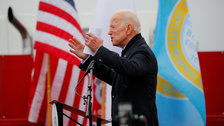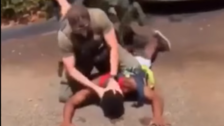

Former Vice President ’s invocation of the deadly tragedy in , Virginia, as his reason for seeking the presidency is angering progressive activists there who believe the Democrat is using the city as a prop to help convince primary voters to look past his own questionable record on race.
“Charlottesville, Virginia, is home to the author of one of the great documents in human history,” Biden says at the beginning of the three-minute video he released Thursday to launch his third bid for the presidency, invoking Thomas Jefferson and the Declaration of Independence. “Charlottesville is also home to a defining moment for this nation in the last few years,” he continues, as the screen fades to video of the tiki torch-wielding white supremacists who marched through the 48,000-person college town in August 2017, the night before a counterprotester was murdered. Biden says their “crazed faces” were “illuminated by torches, veins bulging and bearing the fangs of racism.”
Biden’s campaign is framing the “Unite the Right” protests and counterprotests in Charlottesville ― and President Donald Trump’s infamous remark claiming there were “very fine people on both sides” ― as a historic aberration from American ideals and norms, a moment Biden must run for the nation’s highest office in order to fix. But for the activists who live there, Charlottesville is a still-traumatized city, one that is still trying to heal from historic racial injustices, and one Biden hasn’t visited since that deadly weekend 20 months ago.
“We’ve struggled to heal from that trauma. The trauma from August of 2017 still isn’t over for many of us. There’s been trials, there’s been constant reminders,” said the Rev. Seth Wispelwey, an activist and Charlottesville native who was attacked by white supremacists when he linked arms with other clergymen in one episode from the violent weekend. “For a presidential candidate like Joe Biden who has a disturbing legislative and policy history on race dating back to the 1970s to cite Charlottesville as a reason to launch his campaign is unwelcome.”
Wispelwey said Biden was using the city as a “prop,” a sentiment many other activists in the city share.
“The question that keeps coming up: If you care so much about Charlottesville, why weren’t you here right after 8/11 and 8/12?,” asked Don Gathers, another activist in the city, using shorthand for the weekend of the violence.
Adding to their anger is Biden’s own mixed record on race issues. While his loyal service as vice president to the first-ever black president of the United States has won him plaudits from prominent black Democrats and fond feelings from voters, his decades-long stint in the Senate has drawn intense scrutiny as he prepares another presidential run. He was a vocal opponent of using busing to desegregate schools in the 1970s, has long faced criticism for his handling of the Anita Hill hearings in 1991, and supported a crime law in the mid-1990s that is now blamed for skyrocketing levels of incarceration for black men.
“Folks don’t let stuff like that go,” Gather said of Biden’s record.
It’s unclear how seriously the Biden campaign discussed actually launching his campaign in the intensely liberal city, but activists there said any Biden event likely would have been met by significant protests. Biden has long pointed to Charlottesville as the first moment that required him to speak out forcefully against the president, and he wrote an essay for saying Trump had “emboldened white supremacists with messages of comfort and support.”
The anger at Biden isn’t universal. Mike Signer, who was the city’s mayor at the time of the deadly clash, praised Biden’s decision to center his campaign around the city, and other Democrats said the decision showed he was serious about taking on Trump’s racism.
“We wouldn’t want him to ignore this. It’s one of the critical issues in this country,” Del. Dave Toscano, a Democrat who represents the city in the state legislature, said in a phone interview arranged by the Biden campaign, saying he hoped Biden would visit the city soon. “I think Vice President Biden feels strongly that President Trump has shown he can’t lead on this and on so many other issues.”
Wes Bellamy, a member of the Charlottesville City Council who was key in the push to remove the statue of Robert E. Lee ― which eventually led to the “Unite the Right” protest ― acknowledged there were “mixed feelings” in the city about Biden’s message.
“There are some who are concerned that Vice President Biden is using our city to catapult himself into the presidential race,” Bellamy said on CNN. “And there are people here who are glad that Vice President Biden has decided to take on [Trump] directly. He has been very direct in regards to addressing white supremacy in his initial rollout.”
Ultimately, though, he sided with Biden. “Personally, I’m proud of that,” Bellamy said.


